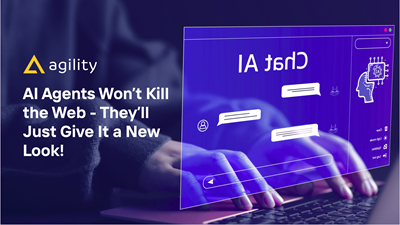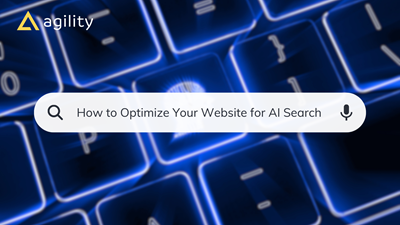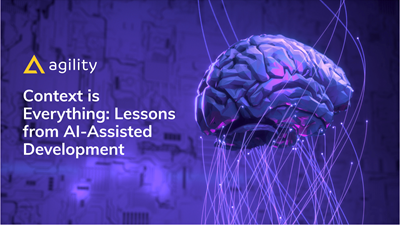AI Agents Won’t Kill the Web - They’ll Just Give It a New Look!
Bye-bye internet? Not so fast.


There’s a growing narrative in tech circles — especially among AI enthusiasts — that we’re heading toward a future where the web dies, replaced entirely by intelligent agents:
- No browser.
- No UI (or controlled standardized UI in the AI)
- Just voice and chat. Everywhere.
In recent thought provoking discussions with Agility CMS CTO Joel Varty we explored the ideas of this kind of future. Agent-driven everything. No more classic web stack. You talk, it does.
Since I'm the type of geek that lays awake at night dreaming of the next evolution of technology, naturally I started thinking more and more about this idea and decided I needed to expand on our thought excercise. While I share the optimism and excitement for this kind of future, I’m not convinced the web’s obituary is being written just yet.
There’s a very long road between where we are and that agent-first world — and some fundamental hurdles in the way.
Running Everything on AI Is a Scalability Nightmare
We don’t talk enough about the operational cost of replacing our interfaces with AI.
You’re effectively replacing stateless, cacheable, mostly offline-capable frontends with persistent, compute-bound, token-hungry interactions. Every scroll, click, or form fill becomes an AI prompt. Every prompt costs tokens. Tokens cost power. Power costs money.
You’re not just building a new interface.
You’re inflating the global energy bill.
Sure, you can argue optimizations will come — and they will — but AI is inherently compute-heavy. You’re still moving from a few bytes over the wire to running inference on multi-billion parameter models.
That’s not a small jump. That’s a paradigm shift in cost structure.
Yes, Smaller Models Are Coming… But They’re Not the Whole Answer
Researchers are building smaller, offline-capable models. That’s promising — and I’m excited for it. But let’s not mistake progress for parity.
These smaller models still have trade-offs:
-
Lower accuracy and reasoning depth.
-
Limited context capacity.
-
Ongoing need for updates and fine-tuning.
They might offload some interactions locally — but for anything nuanced or domain-specific, you’re still going back to the cloud. That means tokens. That means cost. That means infrastructure.
So while local models reduce friction, they don’t eliminate the core problem: AI at scale isn’t free. Economically or environmentally.
What About IoT and Embedded Devices?
Here’s a hard truth: you’re not running a generative AI agent on your thermostat.
Most of the IoT world operates in real-time, with minimal memory, offline reliability, and strict power constraints. These devices can’t afford the latency or bandwidth of querying a model for every interaction — let alone host one locally.
Agents can summarize IoT data, or trigger automations based on it. But they’re not replacing your embedded firmware stack anytime soon.
We need to stop pretending AI is a silver bullet for everything.
User Habits Die Hard — Especially Across Generations
There’s also a behavioral side to this.
Younger generations? They’ll run toward agentic ecosystems without looking back. They already treat ChatGPT like Google.
But try telling my mom to “just ask the assistant.”
She’s never used “Chatgibbidy” (yes, that’s what she calls it). She likes search boxes. She likes browsing for products across sites. She trusts pages she can read. She doesn’t want an invisible assistant making decisions for her.
And she’s not alone. You don’t disrupt decades of learned digital behavior overnight. It takes time. Trust. Generational change.
We’re Not Headed Toward Agent vs Web — We’re Headed for Agent + Web
This isn’t a winner-takes-all game.
What’s far more likely — and frankly, more sustainable — is a blended ecosystem:
-
Agents for orchestration, automation, and assistance.
-
Classic web for control, transparency, and permanence.
-
Devices that offer both — like AI-first tablets or agent-powered browsers.
Think of agents as a new interface layer, not a replacement. They’re here to reduce friction — not erase autonomy.
Websites Still Matter — Especially in a World of Agents
As a CMS platform, we have to ask: What’s the role of a website in an agent-first world?
The answer? A critical one.
Agents may change how users access information, but they still need somewhere to get that information from. That “somewhere” is your website. Your structured content. Your API.
In fact, if agents are going to be scraping, summarizing, and interfacing with your digital presence, the quality of that presence becomes even more important.
-
Is your site semantically structured so agents can parse it?
-
Are you exposing clear metadata, structured data, and clean URLs?
-
Can your content be syndicated or embedded in different contexts — chat, voice, apps, embedded interfaces?
In this new era, a CMS isn’t just a publishing tool — it’s the source of truth for every agent, assistant, or AI that interacts with your brand.
If you neglect your site because “agents are the future,” you risk making yourself invisible to the very interfaces your users will soon rely on.
Be sure to check out Joel's blog on Optimizing your website for AI Search
Let’s Build for Reality, Not Hype
If you’re building for the future, don’t throw out the old playbook just yet. The browser’s not dead. APIs aren’t going away. IoT won’t suddenly learn to chat.
Instead, ask:
-
Where can agents truly enhance the experience?
-
What should remain direct and deterministic?
-
How do we design with both in mind?
Because the real future isn’t chat-only. It’s multimodal, multi-device, multi-interface.
It’s agent-enhanced, not agent-exclusive.

About the Author
A versatile full stack developer with a passion for supporting other developer experiences. Upgrading from a long time end user of Agility, Aaron is new to the Agility CMS team joining in 2024. That won't stop him from trying to make a big impact!
Overseeing the Starters, SDKs, CLIs and more, look from some awesome new frameworks and tools coming to the Agility CMS platform!
When Aaron's not turning coffee into code, he's probably off with his two boys on a weekend adventure!



